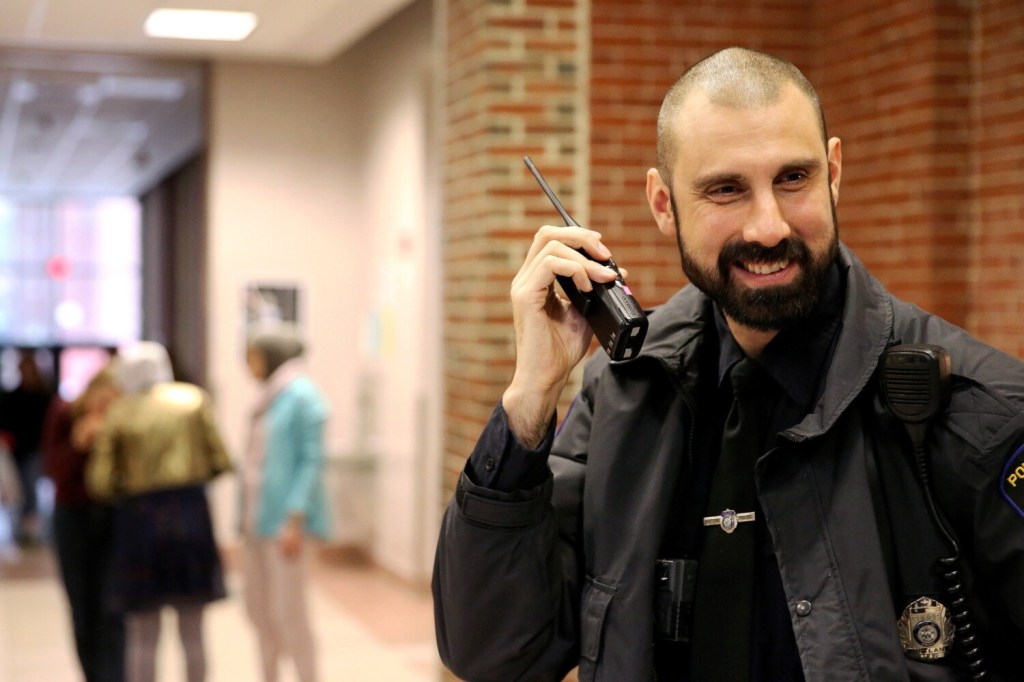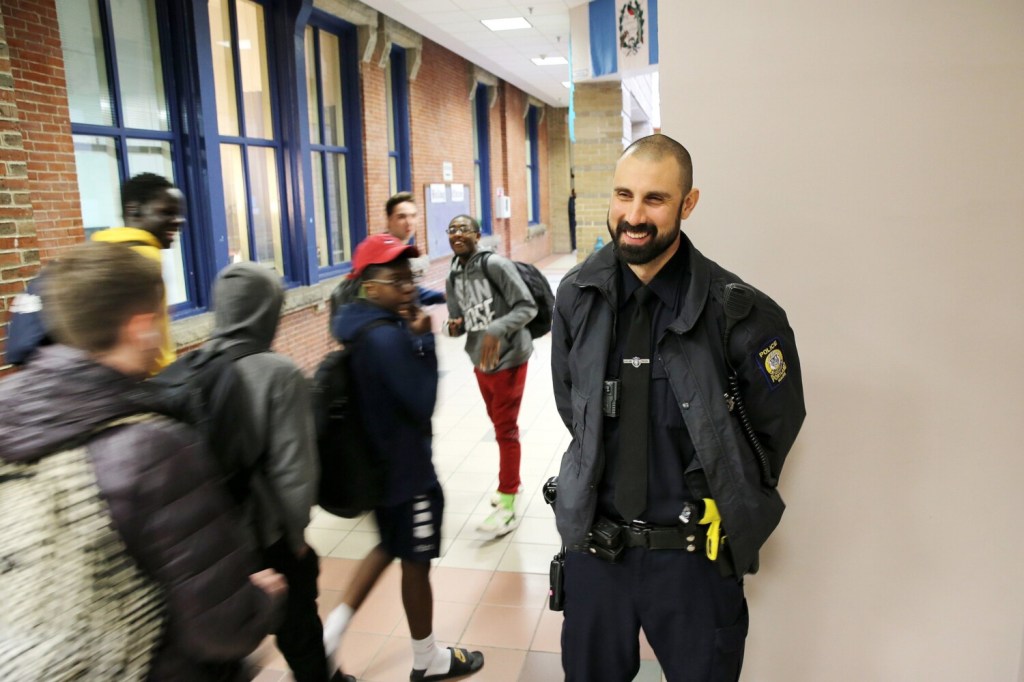Mike Bennis likes to keep his office at Portland High School stocked with peanut butter crackers, a favorite snack of one of the students he works with.
The popular school resource officer typically keeps his door open for students to poke their heads in. It’s not unusual for him to call out from his desk, “What’s happening?” or “Good morning,” especially if he notices a student in the hall who should be in class.
“I try to build relationships with kids, especially the really vulnerable,” said Bennis, a tall, soft-spoken officer in his third year on the job. “A lot of times I already know them because I’ve arrested their parents or seen them on patrol. This gives me the opportunity to have a positive impact.”
Across the country and in Maine, the number of school resource officers has grown in recent years, largely in response to gun violence and safety concerns.
But preventing school shootings is just a small part of the work done today by officers, whose duties have evolved to include counseling, connecting families with social services and teaching students about criminal justice.
At the same time, a national debate over police accountability is also being felt by school resource officers, raising questions about whether police should be in schools and what their impact is on students.
In Portland, a recent move by the Portland Police Department to equip all its officers with body cameras has led to broader questions about how the officers are operating and whether they contribute to inequities felt by minority students.
The school board is scheduled to vote Tuesday on a memorandum of understanding with the police department that includes new language for the use of body cameras and could help other districts shape similar rules.
Superintendent Xavier Botana said he is aware of some of the concerns that have arisen at the national level, as well as from the Portland school board, but he’s confident in the work the officers are doing.
“We entered into this conversation with our eyes wide open,” he said. “This was an important policy conversation for the board to have because so many things have changed since the school resource officers were first implemented in Portland schools.”
There are currently around 80 school resource officers in Maine. The National Association of School Resource Officers estimates there are between 14,000 and 20,000 such officers nationwide.
Advocates of the job say it does add to school safety, helps build positive relationships with students and teaches them to trust police and use them as a resource.
Others point to research linking officers to higher rates of discipline for minority and disabled students and say given the choice of where to spend their money, schools should be investing in social workers and counselors rather than law enforcement.
Last month, a study released by Boston-based Strategies for Youth, an organization looking to improve relationships between police and young people, cited evidence that the presence of law enforcement in schools increases the odds students will be arrested for minor offenses and that children of color or with disabilities will be treated more harshly.
The study also found it’s unclear how effective school resource officers are in preventing school violence, although that remains a leading reason cited by schools for implementing them.
“I’ve heard many people in our community express concerns about these issues: the lack of clarity (around the job), over policing of students of color and our role in systems that already presume inequities,” said Portland school board Chairman Roberto Rodriguez. “Our responsibility as stakeholders is to ask these questions and demand clarity around these issues.”
The state of Maine is also working to get a better grasp on how school resource officers operate and what guidance should be made available to schools after a first-of-its-kind report released last month by the Cutler Institute at the University of Southern Maine found wide variation and a need for more oversight of school resource officer programs statewide.
At Portland High, a typical day for Bennis starts around 6:45 a.m. He stands in the hallway of the school and greets students as they come in the doors. Being goofy and friendly is part of his strategy.
“I was very quiet for a long time and just stood in the hallway,” said Bennis, recalling when he started on the job in 2017 after 17 years as a patrol officer. “I didn’t realize because of that kids were apprehensive about talking to me.”
Now he reaches out to students by name in the morning, making a special effort to connect with those he knows are shy or are dealing with problems outside of school.
An assistant principal, concerned about a situation with a student, takes him aside for a few minutes before the morning announcements. Two girls also ask to talk to him and he arranges for them to come stop by his office later.
Administrators at the school love having Bennis around, even though the amount of criminal activity that takes place is small.
In 2018-2019, there were 53 calls for police service at Portland High, 11 incident reports and five juvenile summonses.
Deering High School, the only other school in the district with a full-time school resource officer, had 52 calls for service, 11 incident reports and five juvenile summonses in 2018-2019.
Calls for service are any report made from a particular location, and don’t necessarily take place during school hours or involve students.
Both schools have had just one arrest each over the course of the last three years.
“It’s hard to explain (what the officer does) unless you experience it,” said Portland High Principal Sheila Jepson.
She said while Bennis does dedicate some of his time to things like ensuring illegal substances aren’t being brought into the school or safety issues, he’s also someone students can talk to.
“Sometimes there’s a stigma around going to see a social worker,” Jepson said. “Like, ‘What does that mean?’ But if I can go to the school resource officer because I’m worried or concerned, I think students feel safer doing that.”
At the same time, some Portland school board members have questioned generally the presence of law enforcement in schools.
“If you look at the state or national level, there are a lot of parallels between school discipline data and larger issues like mass incarceration,” said board member Tim Atkinson. “Where do the SRO’s fit into that equation? I think having that law enforcement presence in schools on a daily basis makes using that law enforcement option that much easier.”
The ACLU of Maine, which has voiced opposition to body cameras on school resource officers, also has concerns about police in schools generally and why schools aren’t using those resources to invest more in mental health for students.
“There is no evidence SROs make schools safer,” said Alison Beyea, executive director of the ACLU of Maine. “There is evidence that increasing the number of mental health professionals not only makes schools safer – it decreases suspensions, expulsions and disturbances to the community.”
At the most recent school board meeting, however, Portland Police Chief Frank Clark concluded a discussion on a recent lockdown at Portland High School by saying that not having school resource officers in 2019 to handle such safety incidents would be “negligent.”
In an interview, Clark said the officers go a long way in contributing to both a sense of safety as well as actual safety when it comes to responding to specific incidents. They also build trust and relationships between police and students, helping divert cases away from the juvenile justice system.
“Those relationships are invaluable both in the community and in today’s society, where news bites tend to depict police in a negative light,” he said. “The interactions I see between our SROs and the kids (are positive). Sometimes they’re literally tying kids’ shoes.”
Across the country, school resource officers and other police have been scrutinized for their behavior in the wake of high-profile police-involved shootings and other incidents.
In Florida last week, a school resource officer was arrested after surveillance footage showed him slamming a female student to the floor at a school for children with emotional and behavioral disabilities.
In New Mexico, another officer resigned recently after video showed him roughing up an 11-year-old girl who allegedly took more milk than she was supposed to from the cafeteria.
Botana, the superintendent, said incidents like that are not indicative of the work in Portland schools.
“I don’t see any evidence of that in our practice,” he said. “So while I can understand in general concern about overpolicing in minority communities, I don’t think that’s true in our context. I think we have discipline disparities, but those are not caused by police presence.”
At Portland High, Bennis is not involved in decisions to discipline students or carry out school policies, though he does inform administrators about things he sees and hears.
Years of work as a patrol officer have informed the decisions he makes – usually resulting in him thinking things are less serious than school administrators might.
“If they’re going to suspend someone for something, it’s usually something that wouldn’t even hit my radar on patrol,” Bennis said. “A lot of times I have to stop myself from advocating for (the students) and saying, ‘Hey, can you not suspend this kid?'”
When he first started, Bennis said he was surprised by the amount of social work and outreach his job entails. In the last three years he has knocked on students’ doors to ensure they aren’t skipping school and helped buy a mattress for a student who told him she was sleeping on couch cushions on the floor.
At lunchtime he hands out cards that hungry students can take to Subway to get free sandwiches. On his phone he has pictures of graduation cards he’s painted for students and drawings he’s given them as gifts.
Obed Ntumba, a senior, said he recently got a ticket while learning to drive and going the wrong way down a one-way street. He went to Bennis to ask him what to do.
“He was actually helpful,” Ntumba said. “I went to court and listened to what he said and it worked out. I didn’t have to pay.”
After a report of a gun last month that sent the school into lockdown, Assistant Principal Kimberly Holmes said Bennis was instrumental in ensuring the safety of students and staff.
“These conversations about SROs and why do we have them in the building, I completely disagree with,” she said. “He is an incredible asset. They all are to schools and safety, especially when the whole country is talking about this stuff all the time. Why would we then go backwards?”
Send questions/comments to the editors.





Success. Please wait for the page to reload. If the page does not reload within 5 seconds, please refresh the page.
Enter your email and password to access comments.
Hi, to comment on stories you must . This profile is in addition to your subscription and website login.
Already have a commenting profile? .
Invalid username/password.
Please check your email to confirm and complete your registration.
Only subscribers are eligible to post comments. Please subscribe or login first for digital access. Here’s why.
Use the form below to reset your password. When you've submitted your account email, we will send an email with a reset code.